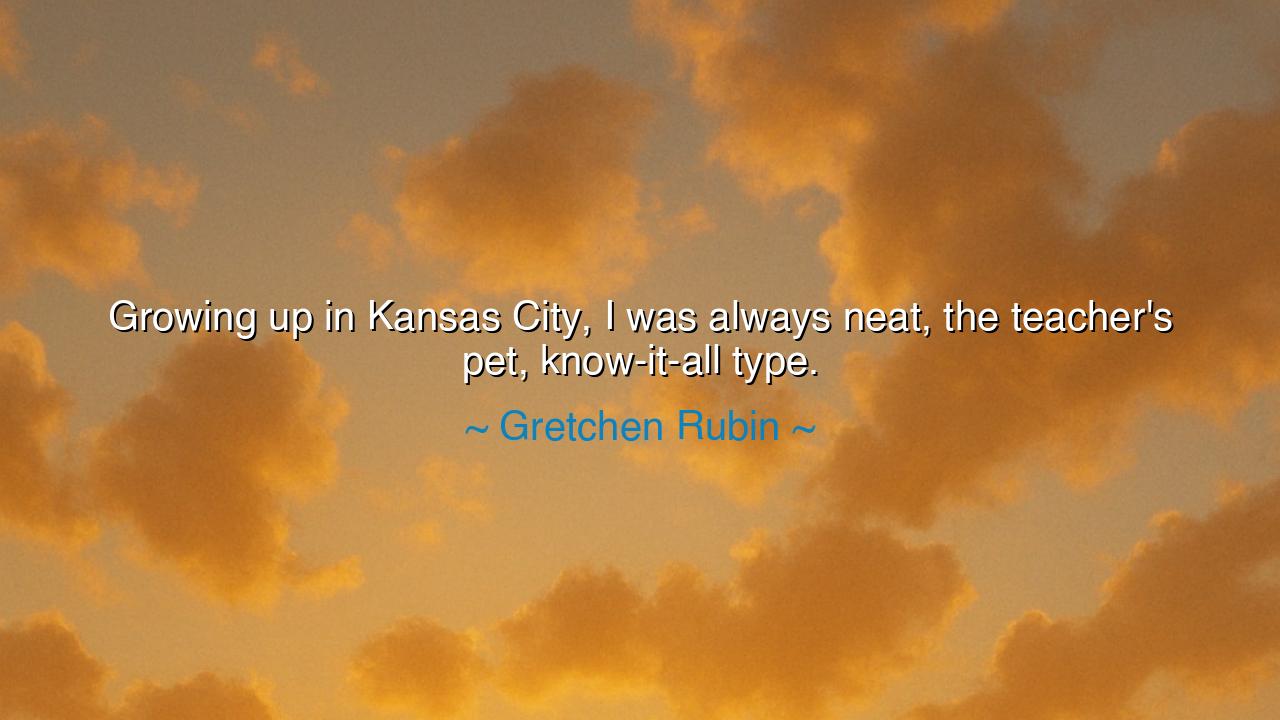
Growing up in Kansas City, I was always neat, the teacher's pet






Gretchen Rubin once confessed: “Growing up in Kansas City, I was always neat, the teacher’s pet, the know-it-all type.” At first glance, these words may sound like a simple memory of childhood, but within them dwells a profound truth about identity, discipline, and the shaping of character. She speaks not only of her youth, but of the seeds from which her life’s work would later blossom. For the one who is neat learns the value of order, the one who becomes the teacher’s pet discovers the power of approval and guidance, and the one who is called know-it-all embraces—sometimes painfully—the burden and gift of curiosity.
To be neat is more than to have tidy papers and folded clothes; it is to seek harmony between inner and outer life. The ancients knew that order in one’s dwelling reflects order in the soul. Pythagoras demanded cleanliness and symmetry from his students, believing that the spirit is lifted when the environment is in balance. Rubin’s instinct for neatness, born in Kansas City, was not vanity, but a child’s alignment with the eternal law: that chaos is natural, but beauty is chosen.
To be the teacher’s pet is also to live in the tension between admiration and envy. On one hand, it speaks of a soul eager to learn, eager to please, eager to climb the mountain of knowledge under the hand of a guide. On the other hand, it often draws the disdain of peers. Yet history shows that many who were close to their teachers became the torchbearers of wisdom. Consider Alexander the Great, pupil of Aristotle—was he not his teacher’s pet, carrying forward the philosopher’s thought into every land he conquered? Rubin’s childhood eagerness foreshadowed her path: a life of observation, learning, and eventually teaching others through her writings.
To be a know-it-all is to bear a double-edged name. It is a title sometimes spoken with scorn, for the world resents those who stand too brightly. Yet it is also a sign of a spirit unwilling to sit in darkness, always seeking more, always questioning. Recall the young Socrates, mocked for his endless questions, yet destined to become the gadfly of Athens. The know-it-all, if tempered with humility, becomes the seeker who illuminates the way for others. Thus, Rubin’s words reveal not arrogance, but a fierce hunger for truth—a hunger that would later give birth to her explorations of happiness, habits, and the hidden order of life.
From this memory, we can draw a greater lesson: that what others mock in youth may become one’s greatest strength in maturity. The neatness that others might call obsessive becomes the foundation of clarity. The closeness to the teacher that provokes teasing becomes the gateway to wisdom. The scorned know-it-all becomes the one who truly knows, because she refused to stop asking, learning, and refining. The river of destiny often begins as a trickle of small habits, but in time it carves canyons through the world.
So let us take heed, O seekers: embrace your early traits, even those misunderstood by others. If you are orderly, use your order to bring peace into a chaotic world. If you are close to mentors, cherish that bond and draw from their wisdom. If you are accused of knowing too much, do not let it silence you; instead, temper your knowledge with humility and transform it into light for others. What is mocked in childhood may prove to be the very stone upon which your life’s temple is built.
Practical action flows from this truth. Reflect on the names you were given in youth—whether praise or insult—and ask: What hidden strength lies within them? Seek to cultivate those strengths with patience and courage. If you are drawn to neatness, use it to create beauty and calm in your surroundings. If you are a seeker of knowledge, channel it into service and teaching. If you long for approval, let it not enslave you, but inspire you to build bridges of respect. In this way, the wounds of childhood may become the wings of adulthood.
Thus, Gretchen Rubin’s recollection is not a small anecdote, but a mirror for us all. To be neat, to be the teacher’s pet, to be a know-it-all—these are not flaws, but signs of a soul in training, preparing for its greater work. The lesson endures: honor the traits that shaped you, for they may hold the key to your destiny.






AAdministratorAdministrator
Welcome, honored guests. Please leave a comment, we will respond soon